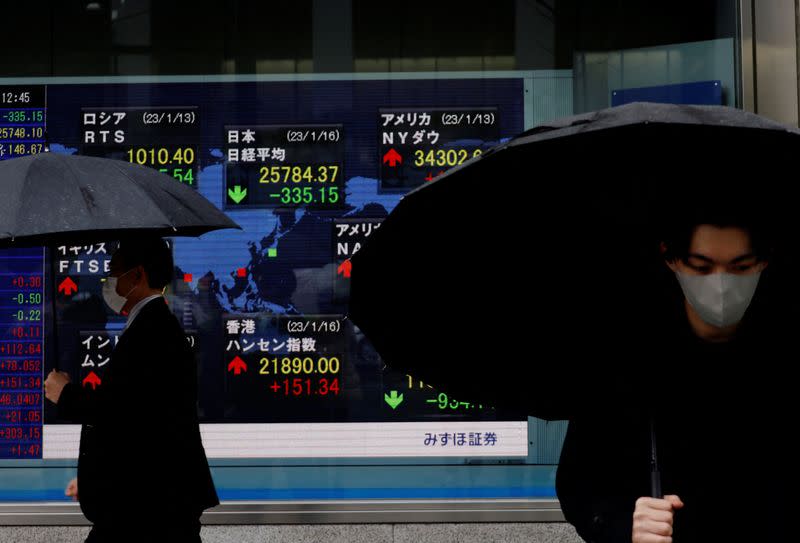Asia’s major stock indexes struggled to find momentum on Tuesday despite rising hopes the US Fed is set to pivot on its long tightening campaign and Beijing reportedly set to roll out more stimulus for its crisis-hit property sector.
Shares across the region had earlier climbed to fresh two-month highs, taking cues from a rally on Wall Street while the dollar languished near its lowest in two-and-a-half months, but that optimism faded as the day closed out.
Japan’s Nikkei share average ended marginally lower, as the yen’s rebound against the dollar prompted a sell-off in automakers’ stocks. A stronger yen weighs on exporters as it hurts the value of overseas profits in yen terms when firms repatriate them to Japan.
Also on AF: China Warns Argentina it Would be ‘Serious Mistake’ to Cut Ties
The Nikkei inched down 0.10% to 33,354.14 after opening up 0.2% and trading marginally higher during the session. The broader Topix slipped 0.20% to 2,367.79. The autos sector index fell 1.75%.
China stocks slipped back too, despite reports of Beijing’s latest stimulus rollout for the property sector lifting risk appetite and bets on an imminent end to high US interest rates.
The blue-chip CSI 300 Index gained 0.13% but the Shanghai Composite Index fell 0.01%, or 0.39 points, to 3,067.93. The Shenzhen Composite Index on China’s second exchange dropped 0.39%, or 7.49 points, to 1,929.00.
Shares of Sunac China Holdings jumped nearly 20% after the embattled property developer said each of its restructuring conditions have been met and its debt overhaul plan has become effective.
The CSI 300 Real Estate Index jumped 3.6%, while the Hang Seng Mainland Properties Index surged 4.3%.
In Hong Kong, tech giants gained nearly 1%, with Alibaba Group and Meituan up more than 3% each. But a mainland sell-off saw Hong Kong’s Hang Seng Index lose 0.25%, or 44.18 points, to close at 17,733.89. The Hang Seng China Enterprises Index lost 0.44%.
Elsewhere across the region, in earlier trade, Sydney, Seoul, Mumbai, Taipei, Bangkok and Manila were also up, though Singapore, Jakarta and Wellington fell.
MSCI’s broadest index of Asia-Pacific shares outside Japan was 0.97% higher at 510.11 having touched 511.05, the highest since September 18. The index is up 7% for the month and on course for its biggest monthly gain since January.
Eyes on Nvidia Earnings
Investor focus later in the day will firmly be on minutes of the Federal Reserve’s last meeting to gauge which way rates are headed and also on earnings from Nvidia, which hit a record high on Monday.
In the previous session, Wall Street’s three major stock averages rose with Nasdaq’s 1% rally leading the charge as heavyweight Microsoft hit a record high after it hired Sam Altman, who headed OpenAI until he was ousted late last week.
Stock markets have broadly rebounded in November as a flurry of data that showed US inflation might be easing has spurred bets that the Fed is done with monetary tightening and rate cuts may be on the way next year.
Traders have nearly fully priced in the likelihood that the Fed will keep interest rates unchanged in December, and some have started pricing in rate cuts as soon as March, according to the CME Group’s FedWatch tool.
Trading is expected to be muted for much of the week ahead of Thursday’s US Thanksgiving holiday and a sparse data calendar for the week.
Treasury yields were lower in the wake of solid bidding in the $16 billion sale of 20-year Treasury bonds on Monday that suggested the market still anticipates inflation will decelerate and the Fed will cut rates next year.
The yield on 10-year Treasury notes was down 2.9 basis points to 4.393%, while the yield on the 30-year Treasury bond was down 4.2 basis points to 4.533%.
Yen Strengthens Against Dollar
Lower yields kept the dollar on the back foot, with the dollar index, which measures the US currency against a basket of six major currencies, down 0.135% at 103.31, having touched near three month low of 103.17 earlier in the session.
The Japanese yen strengthened 0.22% to 148.03 per dollar, lifting away from the one-year low of 151.92 it touched last week.
The Australian dollar, often seen as a barometer of risk appetite, touched a three-month high of $0.65775 earlier in the session.
The head of Australia’s central bank said on Tuesday inflation will remain a crucial challenge over the next one to two years, in comments made two weeks after policymakers raised interest rates to a 12-year high earlier to tame high prices.
Oil prices eased, reversing the previous day’s rally. US crude eased 0.46% to $77.47 per barrel and Brent was at $81.94, down 0.46% on the day.
Key figures
Tokyo – Nikkei 225 < DOWN 0.10% at 33,354.14 (close)
Hong Kong – Hang Seng Index < DOWN 0.25% at 17,733.89 (close)
Shanghai – Composite < DOWN 0.01% at 3,067.93 (close)
London – FTSE 100 < DOWN 0.39% at 7,467.05 (0935 GMT)
New York – Dow > UP 0.58% at 35,151.04 (Monday close)
- Reuters with additional editing by Sean O’Meara
Read more:
Japan’s Salaries Surge Could See BoJ Turn to Tightening
Japan to Drop Quarterly Reports for Listed Businesses – Nikkei
Turmoil at OpenAI After Board Coup, Altman Heads to Microsoft
Nikkei U-Turn After Early Surge, Hang Seng Enjoys Tech Boost
























